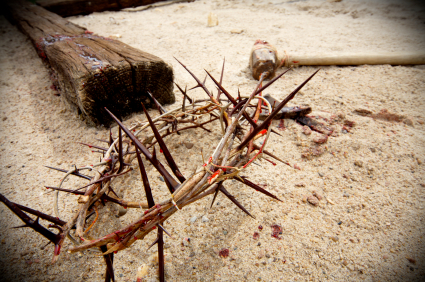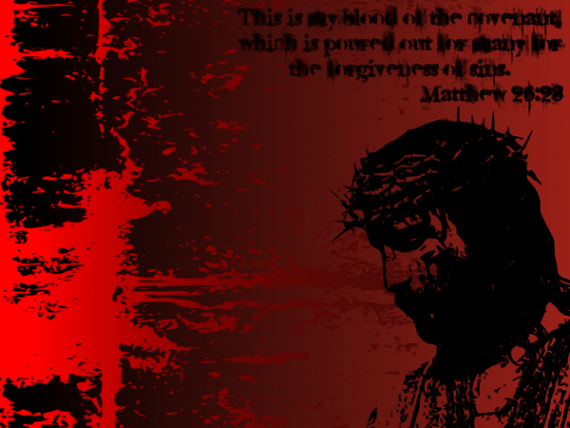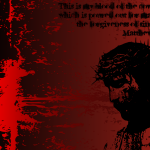In Matthew 26:28, Jesus says, “For this is My blood of the new covenant, which is shed for many for the remission of sins.” Does this mean that the blood of Jesus had to be shed so that He could buy forgiveness of sins for us from God?
Let’s see … what is the best way to answer this question? … Let me try this:
NO!
Ha!
 But I bet you want a better explanation …
But I bet you want a better explanation …
I know that there are several verses in the Bible that some use to argue for the idea that Jesus had to shed His blood to purchase forgiveness of sins from God, but when carefully studied in their contexts, none of these Bible passages are teaching this idea.
God has always forgiven all people of all their sins simply because this is who God is. He did not need to be paid off or bought before He could forgive us. (That wouldn’t be forgiveness anyway…. you can either forgive a debt or be repaid, but not both.)
Matthew 26:28 is one of the passages that sometimes is quoted in defense of this idea that Jesus paid for our sins with His blood.
During the Last Supper on the night before His arrest, trial, and crucifixion, Jesus shared the Passover Meal with His disciples and imbued new symbolism into the bread and wine.
He said that the bread represented His body broken for them and the wine represented His blood shed for them. He then said that these things point to the new covenant in His blood, which is for the forgiveness of sins.
Some seem to assume through this description of events that Jesus was teaching His disciples that His blood would purchase the New Covenant and the forgiveness of sins from God.
But there are two keys which provide a better understanding of this text. A careful look at the context and what the rest of the New Testament teaches about the New Covenant and forgiveness reveals something different.
Let us briefly consider both concepts and how they relate to Matthew 26:28.
Matthew 26:28 and the New Covenant
Jesus was not teaching that His blood was the purchase price for forgiveness and the New Covenant, but that His blood was the sign of such things.
 In reference the New Covenant, the blood of Jesus signaled that this New Covenant was now in effect. In essence, Jesus died to inaugurate or enact the New Covenant.
In reference the New Covenant, the blood of Jesus signaled that this New Covenant was now in effect. In essence, Jesus died to inaugurate or enact the New Covenant.
It is important to think of the New Covenant, not as a new system of laws and regulations to keep, but instead as a Last Will & Testament. And indeed, the term Jesus uses here does have this idea in view. Jesus is not sharing a new legal Contract, but new legal Will.
When we think of the Covenant as a “Last Will & Testament” rather than as a legal contract (as the Greek words used seem to indicate), it becomes clear that a Last Will & Testament is not put into effect as long as the one who made it still lives (cf. Hebrews 9:15-17).
For a Last Will & Testament to be enacted, the one who made it must die. Yet since this is God’s Last Will & Testament, and since God cannot die, it was impossible for the Will to come into effect unless God became human and died as a human, which is what He did in Jesus Christ.
So when Jesus speaks of His blood representing the New Covenant, He is pointing out the fact that the New Covenant which had been promised through the Old Testament prophets (cf. Jeremiah 31:31-34) would now be put into effect because the one who made this Last Will & Testament was now here and was about to die.
All of this is explained in more detail in Hebrews 9–10.
So when we understand that Jesus is talking a Last Will instead of a legal contract in Matthew 26:28, we then understand that the blood of Jesus was for the purpose of enacting the legal terms of this new Last Will & Testament. The death of Jesus was not needed to buy forgiveness, but to enact a new Will.
But what about the statement in Matthew 26:28 about the forgiveness of sins? Doesn’t that prove that Jesus did, in fact, die to purchase forgiveness of sins from God?
Matthew 26:28 and the Forgiveness of Sins
When it comes to the forgiveness that Jesus mentions in Matthew 26:28, it is critical to recognize that there are two types of forgiveness in the Bible.
 There is charizomai forgiveness and aphēsis forgiveness. Charizomai forgiveness is based on the free grace (charis) of God and is freely extended to all people throughout all time for all sins, with no strings or conditions attached.
There is charizomai forgiveness and aphēsis forgiveness. Charizomai forgiveness is based on the free grace (charis) of God and is freely extended to all people throughout all time for all sins, with no strings or conditions attached.
Aphēsis forgiveness, however, does have conditions, such as repentance and turning from sin. But aphēsis forgiveness has nothing to with our standing with God or what He thinks about us. Aphēsis forgiveness is not about our relationship with God.
Instead, aphēsis forgiveness is about our relationship with sin. Aphēsis forgiveness is only about one thing, and that is whether or not we are addicted to sin or break free from sin. This is why a better English translation for aphēsis is “release” or “remission.”
Aphēsis forgiveness is not about getting forgiveness from God, but is instead about breaking free from the addictive and destructive power of sin in our lives.
If you are addicted to a certain type or pattern of sin in your life, God has 100% forgiven you for this sin. This is charizomai forgiveness. But God’s charizomai forgiveness doesn’t help you much in breaking free from sin. For this, you need to repent, confess, and take steps to turn away from this sin, and start following God instead. When you do this, you will gain aphēsis, release, from the power of sin in your life.
So what kind of forgiveness is Jesus talking about in Matthew 26:28? It is aphēsis, release. This is why many Bible translations use the word “remission” here instead of “forgiveness.”
Jesus is not talking about how He is going to get God to forgive our sins. No, Jesus is talking about how His life and death, about how His shed blood, is going to help us break free from the power of sin in our lives.
Jesus is telling His disciples that through His blood, that is, through His violent death as a sacrificial scapegoat, they will gain deliverance and release from the sin that has enslaved humanity since the foundation of the world.
And this is exactly what happened. The violent death of Jesus on the cross exposed the lie of scapegoating and sacrificial violence for what it was. Those who see this lie are then able to live their lives in freedom from it.
How to Understand Matthew 26:28
So Jesus’ words at the Last Supper closely mirror what we have seen about blood in Genesis 4:10 and Hebrews 12:24 above. The murder of Abel by Cain represents the fratricidal, murderous violence upon which all human civilization is built. In unveiling this sin, the author of Hebrews compared the word spoken by the blood of Abel with the Old Covenant, and then contrasts this with the word spoken by the blood of Jesus and the New Covenant.

Whereas the Old Covenant and the blood of Abel was concerned with sacrifice, vengeance, and retaliation, the New Covenant based upon the blood of Jesus speaks of grace, mercy, and forgiveness.
And this is what Jesus says to His disciples during their Last Supper.
He brings them to the table and says, “I’m going to inaugurate a New Covenant, a new way of doing things, a new Last Will & Testament. And it’s going to be put into effect through my death. And when you see what I am revealing through my death, you will gain release from the addictive and destructive power of sin that has enslaved humanity since the foundation of the world.”
Do you see? There is no mention in here of buying forgiveness from God. Quite the opposite in fact. Jesus is not saying, “I am going to die so God can forgive you.”
No, Jesus is saying, “I’m going to die so that you can learn that God has ALWAYS forgiven you, and my death will show you how to live in a similar way toward others. My death is going to show you how to extend unconditional love and free forgiveness toward others, as God has always extended toward you. And when you live this way, you will break free from the sin of violent, bloody, sacrificial scapegoating that has plagued humanity since the very beginning.”
So do you see?
The Old Covenant, the Mosaic Covenant, enslaved us to sin, and thus, to sacrificial and scapegoating violence.
But the New Covenant in Jesus, introduced to us and inaugurated for us through His own violent death on the cross, shows that we are completely forgiven and have always been forgiven, and that there is nothing for which God will not forgive us.
The New Covenant enacted through the death of Jesus which brings release from our bondage to sin.
Therefore, we too can forgive. Rather than lash out in violence against those who wrong us, we can, like God, simply extend love and forgiveness.
By seeing God’s loving, forgiving, non-retaliatory character through the death of Jesus, we are shown the way to live in loving, forgiving, non-retaliatory community with other people. Observing the Lord’s Supper serves as a reminder of the way we are to live with one another.
In the Last Supper, Jesus used the cup of wine to symbolize how He was making a new Last Will & Testament with humanity. This time, the Testament will be put into effect by His own blood.
When we see Him do this, it is then that our eyes are opened to the truth about sin. What we see in the death of Jesus helps us finally break free from the destructive power of sin that has plagued humanity since the foundation of the world.
This is how the death of Jesus reveals our sin to us, and releases us from the bondage of sin in our lives.
Jesus did not buy forgiveness of sins for us from God, but instead revealed that God has always loved and only forgiven, and we can live this way as well.
 Understanding the Gospel requires us to properly understand the key words and terms of the Gospel. Take my course, "The Gospel Dictionary" to learn about the 52 key words of the Gospel, and hundreds of Bible passages that use these words.
Understanding the Gospel requires us to properly understand the key words and terms of the Gospel. Take my course, "The Gospel Dictionary" to learn about the 52 key words of the Gospel, and hundreds of Bible passages that use these words.
This course costs $297, but when you join the Discipleship group, you can to take the entire course for free.



